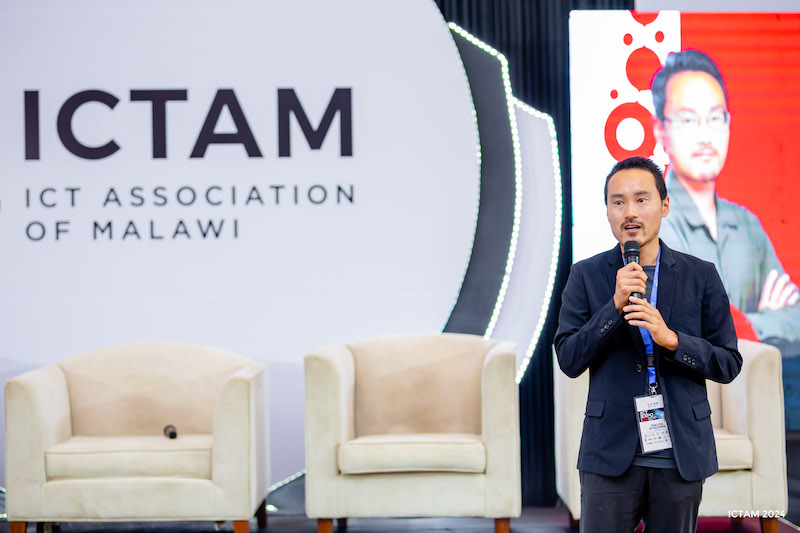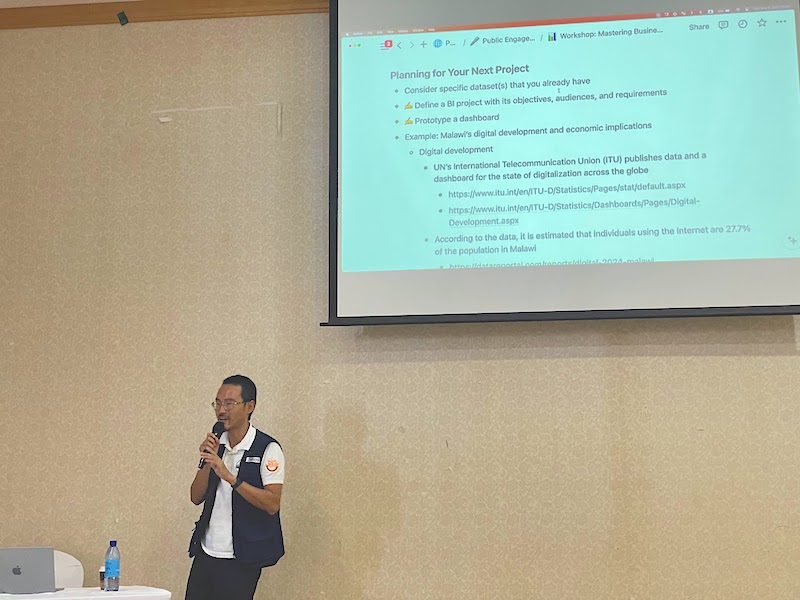 Start your digital transformation from the field, by understanding people. Please—your people are not here, in this big conference hall in the big city.
Start your digital transformation from the field, by understanding people. Please—your people are not here, in this big conference hall in the big city.
That's how I concluded my guest presentation at a conference organized by the ICT Association of Malawi (ICTAM) in the capital city earlier this month, reflecting on my engagements with Malawi's youth- and rural-centered population1.
ICT is today's infrastructure—like roads, water, electricity—and literacy—like reading and writing. That is the power of the people, by the people, and for the people. Thus, the availability of technology is something very tangible, material, and life-changing, both positively and negatively2.
You say "AI," for example. But AI for what? To whom? Where? When? How? These fundamental questions are often overlooked behind technological trends and advances. As a consequence, your "innovation" simply fails, if not significantly damaging surroundings. Downstream impacts of such failures can take multiple forms, such as consumer mental health challenges, exploitation and inequality, climate change, and loss of humanity at large.
Ironically, shortly after I talked about the physicality of ICT at the conference, the internet in East Africa was physically damaged by submarine cable cut at a South African teleport. Social media, search engines, maps, ATMs, credit cards—everything became inaccessible at one point in time, and our day was temporarily in a completely different shape due to the compromised network traffic. The internet and information flowing in the digital world are undoubtedly man-made, and the mass network degradation has reminded us how fragile the systems are.
 * I was traveling in the Zanzibar Archipelago of Tanzania when Tanzania was experiencing the most severe impact of cable cuts among the other African countries. In the disconnected environment, I simply enjoyed walking in town and relaxing beside the Indian Ocean. It reminded me of the no-utility kayaking trip back in Canada; we can be satisfied without the internet.
* I was traveling in the Zanzibar Archipelago of Tanzania when Tanzania was experiencing the most severe impact of cable cuts among the other African countries. In the disconnected environment, I simply enjoyed walking in town and relaxing beside the Indian Ocean. It reminded me of the no-utility kayaking trip back in Canada; we can be satisfied without the internet.
We are dealing with material objects in this beautiful world, and digital technology is fundamentally about humanity. That's why I am a strong advocate for focusing on things that must exist BEFORE applications. In my recent engagement with the World Bank's International Finance Corporation, I emphasized the importance of such foundational matters as follows3.
“I think awareness of literacy education is really vital to accelerating digitalization in Malawi,” says Takuya Kitazawa, an ICT adviser with Mzuzu E-Hub who stresses that any digital innovation in Malawi must first address the entwined challenges of device, network, and education availability. “Without literacy education, nobody can think about how to use technology for businesses,” he says. — Malawians Move Towards a Digital Future
Digital transformation is not something we can achieve purely by technology. At an early phase of my career, I once told my boss, "If you center technology itself in your communications and start advertising our product by a meaningless buzzword like 'AI', I will resign from my job"; although this statement sounds a bit too conservative nowadays, this is how serious I place the humanity first and technology follows. It's just a tool, and we need to talk about tangible issues our world, communities, and/or customers are facing in the first place—like economic development, education, gender equality and social inclusion, climate change, business sustainability, happiness—while considering ICT by design.
Such a statement has been the core of my work for the last few years, even when I delivered a practical, hands-on workshop for business intelligence (BI) a day before the ICTAM conference. I spent half of the allocated time talking about steps to undergo BEFORE manipulating data, such as understanding business, identifying key metrics and audiences, and defining dashboard requirements and specifications. Although there is much tool-specific how-to information, we will end up generating a lot of "useless (if not harmful) dashboards" if we fail to design dashboards in a user-centered manner.
 * Me, facilitating the BI workshop for Malawian business and technology practitioners. As the second bullet point on the screen highlights, the key message was about the importance of starting a BI project by defining objectives, audiences, and requirements; in reality, it's more about product/project management practices than technical competencies.
* Me, facilitating the BI workshop for Malawian business and technology practitioners. As the second bullet point on the screen highlights, the key message was about the importance of starting a BI project by defining objectives, audiences, and requirements; in reality, it's more about product/project management practices than technical competencies.
Let us materialize digital transformation. I'd define digitization and digitalization are about "moving analog to digital" and "optimizing process and operations in a digitized environment," respectively. So, what about digital transformation? It's about the future—driving cultural change and fostering innovation in an inclusive way—and what makes the future tangible is in local contexts, long-term perspective, and communication, coordination, and collaboration with people. Period.
1. See Malawi's population statistics I summarized at Definition, Role, and Current Status of Digital Literacy in Malawi. ↩
2. In contrast to the criticality of ICT infrastructure for ordinary population, Malawi's internet penetration still stays low in less than 30%, according to the latest DataReportal report based on the ITU data and statistics. ↩
3. The interview was conducted when I facilitated a workshop on technology and innovation in Malawi last month, and the story supplements their recent publication "Digital Opportunities in African Businesses." ↩This article is part of the series: Digital Malawi: Developing Hope in the Information Age Ethical Product Developer
Share
Categories
See also
- 2024-06-24
- The End of the Beginning—What I Talk About When I Talk About Malawi
- 2023-09-08
- Definition, Role, and Current Status of Digital Literacy in Malawi #LiteracyDay
- 2023-08-23
- Starting Field Study on How Information Flows in Malawi
Last updated: 2024-05-27
Author: Takuya Kitazawa
Takuya Kitazawa is a freelance software developer, previously working at a Big Tech and Silicon Valley-based start-up company where he wore multiple hats as a full-stack software developer, machine learning engineer, data scientist, and product manager. At the intersection of technological and social aspects of data-driven applications, he is passionate about promoting the ethical use of information technologies through his mentoring, business consultation, and public engagement activities. See CV for more information, or contact at [email protected].
Support by donation Gift a cup of coffeeDisclaimer
- Opinions are my own and do not represent the views of organizations I am/was belonging to.
- I am doing my best to ensure the accuracy and fair use of the information. However, there might be some errors, outdated information, or biased subjective statements because the main purpose of this blog is to jot down my personal thoughts as soon as possible before conducting an extensive investigation. Visitors understand the limitations and rely on any information at their own risk.
- That said, if there is any issue with the content, please contact me so I can take the necessary action.